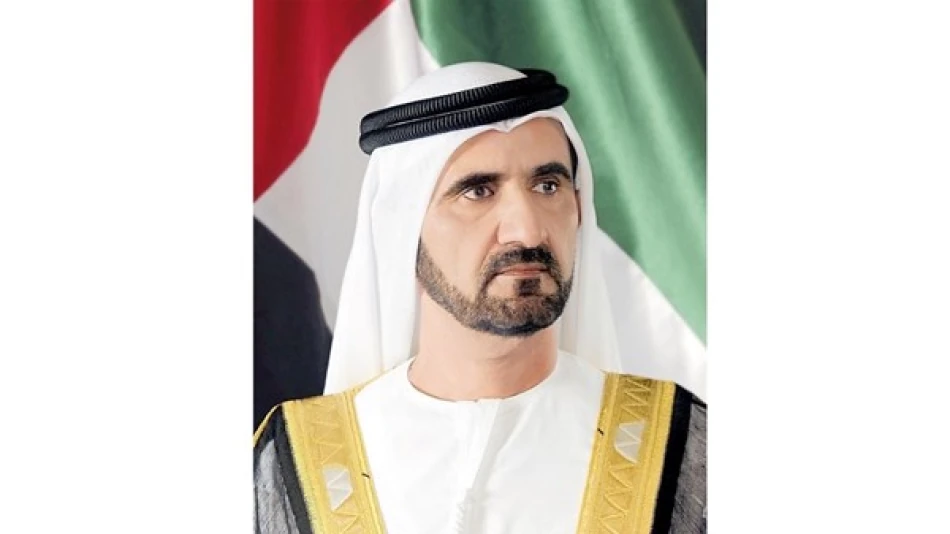
UAE's Non-Oil Trade Hits AED 1.7 Trillion in H1, Showcasing Economic Resilience
UAE's Trade Surge Exposes Global Economic Shifts as Emirates Emerges as Asia-West Bridge
The UAE's non-oil foreign trade exploded by 24.5% in the first half of 2025, reaching AED 1.728 trillion ($470.3 billion) while global trade crawled at just 1.75% growth. This dramatic outperformance signals the Emirates' transformation from a regional hub into a critical bridge between Asian manufacturing and Western markets, fundamentally reshaping global supply chains.
Record-Breaking Numbers Reveal Strategic Positioning
Sheikh Mohammed bin Rashid Al Maktoum, UAE Vice President and Prime Minister, announced the milestone figures that underscore the country's accelerating economic momentum. The trade volume represents double the figures from just five years ago, highlighting an unprecedented expansion that coincides with global supply chain restructuring.
The growth becomes even more striking when viewed against longer timeframes. Trade volumes jumped 37.8% compared to 2023's first half and 59.5% against 2022, while nearly doubling the 2021 figures and more than doubling 2019 levels.
Switzerland Surge Points to Commodity Trading Boom
The most eye-catching figure—a 120% surge in trade with Switzerland—reveals the UAE's growing dominance in global commodity trading. Switzerland hosts major trading houses like Glencore and Trafigura, and this explosive growth suggests Dubai and Abu Dhabi are capturing an increasing share of global commodity flows, particularly metals and energy products traded between Asia and Europe.
Export Revolution Drives Economic Transformation
UAE's non-oil exports reached AED 369.5 billion, marking an unprecedented 44.7% annual growth—the highest in the nation's history. This export boom represents a fundamental shift from the UAE's traditional role as a re-export hub toward becoming a genuine manufacturing and production center.
Exports now comprise 21.4% of total non-oil trade, up from 18.4% in 2024 and 16.4% in 2023. This structural change mirrors Singapore's economic evolution in the 1980s and 1990s, when the city-state transitioned from entrepôt trade to high-value manufacturing and services.
Comprehensive Economic Partnership Agreements Pay Off
The UAE's strategic bet on bilateral trade agreements is delivering measurable results. Trade with Comprehensive Economic Partnership Agreement (CEPA) partners reached AED 85.02 billion, growing 62.8% and accounting for 23% of non-oil exports.
India leads this transformation, with UAE exports jumping 97.6% to AED 51.45 billion—effectively doubling year-over-year. Turkey follows with AED 27.2 billion in trade, up 24.1%. These partnerships have tripled exports compared to 2021-2022 levels and quadrupled 2019 figures.
Geopolitical Implications for Global Trade
The UAE's trade acceleration occurs against a backdrop of US-China tensions and European supply chain diversification efforts. The Emirates is positioning itself as the neutral ground where East meets West, offering multinational corporations a stable platform for regional operations.
The 29% growth in US trade and 15.6% increase with China demonstrates the UAE's unique ability to maintain strong relationships across geopolitical divides. This positioning becomes increasingly valuable as companies seek to "friend-shore" or diversify supply chains away from single-country dependencies.
Re-export Business Remains Robust
Re-export operations reached AED 389 billion, growing 14% annually, proving the UAE's traditional strengths remain intact even as new capabilities emerge. This dual-track approach—maintaining re-export dominance while building manufacturing capacity—provides economic resilience that few other regional hubs can match.
Market Implications and Investment Outlook
For investors, these figures signal several key trends. The UAE's logistics and port operators like DP World are likely beneficiaries of sustained trade growth. The manufacturing sector expansion suggests opportunities in industrial real estate and supporting services.
The commodity trading surge, particularly with Switzerland, indicates Dubai's growing role in global price discovery for metals, energy, and agricultural products. This positions UAE financial markets as increasingly important for commodity-linked investments and hedging strategies.
Infrastructure Investment Vindicated
The trade explosion validates massive infrastructure investments in ports, airports, and free zones over the past decade. Projects like the expansion of Jebel Ali Port and the development of Al Maktoum International Airport now appear prescient rather than speculative.
Import growth of 22.5% to AED 969.3 billion demonstrates robust domestic demand, supporting the UAE's transition toward a consumption-driven economy alongside its trade hub status. This balanced growth profile reduces vulnerability to external trade shocks while maintaining the country's competitive advantages in logistics and commerce.
Most Viewed News

 Layla Al Mansoori
Layla Al Mansoori






